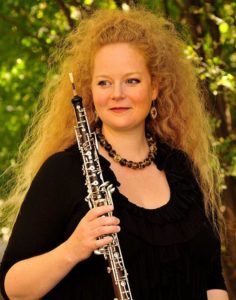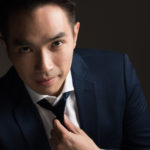I Played Baroque Oboe. In Public….
Have you ever tried something that terrifies you? Well, I did. I played the baroque oboe. In public.
My name is Erin Brophey, and I am the Principal Oboe player here with the SSO. It is a job that I treasure. It is my mission to serve my community by bringing as much beauty as I can to each and every concert.
With that personal goal in mind, I applied to attend the Tafelmusik Baroque Summer Institute in Toronto. Through the financial support of the Sask Arts Board, The Saskatchewan Orchestral Association, The University of Saskatchewan and the SSO, I had the opportunity to work with musicians from the world-renowned Tafelmusik Orchestra and to study the baroque oboe with John Abberger and Marco Cera.
The program offers lectures, workshops, master classes, sectionals, lessons and opportunities to play in public concerts. I would attend countless concerts and essentially live in the 17th century for two weeks
I was terrified.
You may think, “What is the big deal? She is going to study baroque oboe and is an oboe player!” Well, let me inform you that the baroque oboe is NOTHING like the modern oboe I play. I have practiced for tens of thousands of hours to make my modern oboe feel like second nature. The baroque oboe feels completely different. Every musical habit that I have practiced on the modern oboe made the baroque oboe squeak. A lot!
Why would I do this to myself? My motivations were harmless enough: I was curious to learn how early music oboe players play baroque music. I had heard many beautiful recordings that were so different from my modern interpretations of the same repertoire. I wanted to know how they did it! I was intoxicated by the idea of looking at familiar music differently. At this point in my career, making musical discoveries feels so precious! I was excited to discover composers I had never heard of and uncover new musical gems.
The TBSI lived up to my expectations and more! The music proved to be fascinating and so very beautiful. Unfortunately, it wasn’t beautiful the way I played it. Despite my best efforts, I could not wrestle that baroque oboe into submission. Both John and Marco were very encouraging. John would say to me every day “Well, Erin, it IS getting better…” But it was a long way from being beautiful. A LONG way.
When I first began studying the oboe, I had no expectations, no experience and no ego about my ability. On the baroque oboe, however, I brought all of my ego baggage with me. I CAN play all of the music that I was now destroying on the Baroque oboe. Yet every time I played, it was just a question of when I would squeak, squawk or miss notes. Sometimes entire passages would slip by with me sitting and struggling with just the first note!
But, you know what? I am so glad that I did it.
Make no mistake, my ego took a beating. I had to let go of my expectations and just take whatever came. In some cases, I would have an increase in acuity over the course of a piece. In others, I would slide so far backward, it felt like I had lost all ground.
I had forgotten how scary it can be to be out of control. When I had played the baroque oboe for one of my pithy students, she thanked me for demonstrating to her that I must have once been terrible on the modern oboe and clearly had practiced a lot. I am now much more empathetic to my lovely students.
I was not aware of my bias and came to realize that I interpreted Baroque music with modern ears. Looking back at historical records (treatises and artwork) and playing an actual replica instrument is very informative in demonstrating both its abilities and its limitations. For example, in the baroque era, the oboe had only two keys and was made of boxwood. It could only play in six different keys and had a sweet blend-y sound. Now I understand why so much baroque music is scored for doubled oboe and why it is so much more difficult to manage on the modern oboe.
I have a new appreciation for my modern oboe. Like any perfectionist, I can get caught up in the details of my playing. I can become obsessed with two bars of music as I struggle to get them exactly right. Too often, I have let these toils colour my enjoyment of playing. It is easy to forget that I can play 98% of the piece exceedingly well. Playing the baroque oboe reminded me of how much I can do on the modern oboe. Now, I feel like a superstar!
So, as it turns out, doing something hard is a worthwhile experience. I can’t wait to begin a new SSO season and flex my new muscles on my modern oboe. I feel inspired, I feel engaged and I feel refreshed.
I encourage you to try something terrifying like attending the TBSI. It just might be a transformative experience!
Artist Profile – Warren Lee
The SSO is thrilled to present pianist Warren Lee in recital – though he comes to us from Hong Kong, Warren has a pretty cool Saskatoon connection that brings him here each summer…his wife is from Saskatoon!
Hailed by The Straits Times as a musician with “a wonderful sense of colour and impeccably controlled articulation” and lauded by critics of his Carnegie Hall debut as having “thought through his approach to the finest of details and… executed with exact precision…”, Warren’s artistry has brought him to four continents, gracing stages of all sizes and forms and in collaboration with international artists and leading orchestras in Asia.
Warren made his televised début with the Hong Kong Philharmonic Orchestra at the age of six and was the first-prize winner of the 1995 Stravinsky Awards International Piano Competition and the Grand Prix Ivo Pogorelich.
A Steinway Artist since 2009, Warren’s discography includes 8 acclaimed albums of solo and chamber music. The American Records Guide calls him a “first-rate artist”. His playing can also be heard on any Steinway Spirio.
Currently the Music Director of St. Paul’s Co-educational College, a recipient of the Cultural Leadership Citation from Yale School of Music, Warren is co-currently the Hong Kong Representative of Royal Academy of Music, as well as a visiting artist in various institutions around the world. Warren holds an MBA degree, and is an award-winning and internationally published composer as well as an entrepreneur who founded the +myelin app designed for guiding students to practice effectively.
In recognition of his significant contributions to the music profession, Warren received the Ten Outstanding Young Persons Award in Hong Kong in 2012, an Associateship from the Royal Academy of Music in 2015 and the Ian Mininberg Distinguished Alumni Award by the Yale School of Music in 2017
Curated Concerts – Fun and Fresh
Wanting to go to a concert but not sure which one is for you?
This year the SSO is curating it concerts to give you some idea which concerts you’ll love best.
For the music lover who just wants to have fun – its all about the music and a great night out with friends. Get dressed up, get social, and get inspired!
Curated Concerts – Emotionally Powerful
Wanting to go to a concert but not sure which one is for you?
This year the SSO is curating it concerts to give you some idea which concerts you’ll love best.
Want to be moved?
There is nothing more powerful than the sound of a full symphonic orchestra at full forte – we put together this list to highlight this season’s concerts that will blow you away!
Curated Concerts – Family Fun
Wanting to go to a concert but not sure which one is for you?
This year the SSO is curating it concerts to give you some idea which concerts you’ll love best.
Do you remember your first concert? Wanting to make some magical musical memories with your family?
Look no further than this incredible line up of family focused events at the SSO!
Curated Concerts – Classically Curious
Wanting to go to a concert but not sure which one is for you?
This year the SSO is curating it concerts to give you some idea which concerts you’ll love best.
Do you find yourself seeking adventure? Do you love documentaries and podcasts? You’re likely always wanting to get more out of life and live just that little bit on the edge…we’ve put together a list of the events this season that push the limits, explore new sounds, and dig deeper into the stories.
Curated Concerts – Orchestral Romance
Wanting to go to a concert but not sure which one is for you?
This year the SSO is curating its concerts to give you some idea which concerts you’ll love best.
Looking for the perfect date night?
In the movies, the music always makes or breaks the romance…and with music this good, the romance leaps off the stage!
Our Orchestra Romance curated concerts feature some of the best romantic music ever written.
Curated Concerts – For Piano Lovers
Wanting to go to a concert but not sure which one is for you?
This year the SSO is curating it concerts to give you some idea which concerts you’ll love best.
Do you love a piano?
Maybe you have your Gr 8, or you always wished you’d played it, or maybe you just absolutely love the romance and virtuosity of a concert pianist…
Bach’s Magnificent Magnificat
[youtube https://www.youtube.com/watch?v=QQAWqqaUTHE]
In May 1723 Bach was appointed Kantor of St Thomas, Leipzig – we would probably call him the Director of Music – where he remained until his death in 1750. It was a hugely demanding post, involving teaching at the church school, playing the organ, training the choir and composing the music for the city’s two principal Lutheran churches as well as supervising and training the musicians at three others. Despite this enormous workload and recurrent disputes with the city authorities, Bach composed some of his greatest music during this period. His choral compositions alone include such towering masterpieces as the St John and St Matthew Passions, the Magnificat and the Mass in B minor, as well as the Christmas Oratorio and some 250 church cantatas.
The Magnificat – the canticle of the Blessed Virgin Mary (Luke I: 46-55) – traditionally formed part of the ancient Roman Catholic service of Vespers. After the Reformation it was incorporated into the evening services of the Lutheran and Anglican churches, in which it was linked with the Nunc Dimittis. The Magnificat has been set to music more often than any liturgical text other than the Mass itself, in settings that vary enormously in style, from the purity of Palestrina’s exquisite four-part unaccompanied compositions to Monteverdi’s grand, dramatic settings written for St Mark’s, Venice, and later the almost symphonic conception of Mozart’s Vesperae Solennes de Confessore, of which the Magnificat forms the final movement, composed in 1780 for use in Salzburg Cathedral.
Bach’s Magnificat was written in Leipzig for the 1723 Christmas Vespers. This original version was in E-flat and included several additional Christmas texts inserted at various points in the piece. Some years later he revised it, removing the Christmas interpolations to make the piece suitable for use throughout the year and transposing it into D, a much brighter and more satisfactory key for the trumpets in particular.
The extraordinary impact of Bach’s great choral works derives essentially from his remarkable ability to balance, yet at the same time to exploit to the full, the spiritual and dramatic elements of each text, whether it be one as concise as the Magnificat or as monumental as the St Matthew Passion.
The Magnificat is conceived on a grand scale, requiring five soloists, a five-part choir and, for its time, an unusually large orchestra consisting of three trumpets, two flutes, two oboes, strings and continuo. In its splendour and jubilation the piece anticipates the great choruses of the later Mass in B minor. It begins with a brilliant orchestral introduction in which the trumpets feature prominently. This leads directly into an equally impressive chorus, ‘Magnificat anima mea Dominum’ (My soul doth magnify the Lord). The ten verses and Gloria that comprise the Magnificat canticle form a continuous and homogenous whole, in contrast with the libretto of an oratorio or Passion with its wide variety of extracts from many different Biblical and poetical sources. For this reason there are no recitatives in the Magnificat. Instead, each verse receives extended treatment, the chorus supplying appropriate emphasis to sections such as ‘Fecit potentiam in brachio suo’ (He hath showed strength with his arm), while the more reflective verses are assigned to the soloists. In the trio, ‘Suscepit Israel’ (He hath holpen his servant Israel), Bach gives the oboes a plainsong melody traditionally associated with the Magnificat. It appears as a cantus firmus, i.e. a melody in greatly extended notes, against which the three soloists weave decorative vocal lines. For the final verse, ‘Sicut erat in principio …. Amen’ (As it was in the beginning …. Amen), Bach appropriately mirrors the words by recalling the music that was heard ‘as it was in the beginning’, the Magnificat therefore ending as exuberantly and dramatically as it began.






